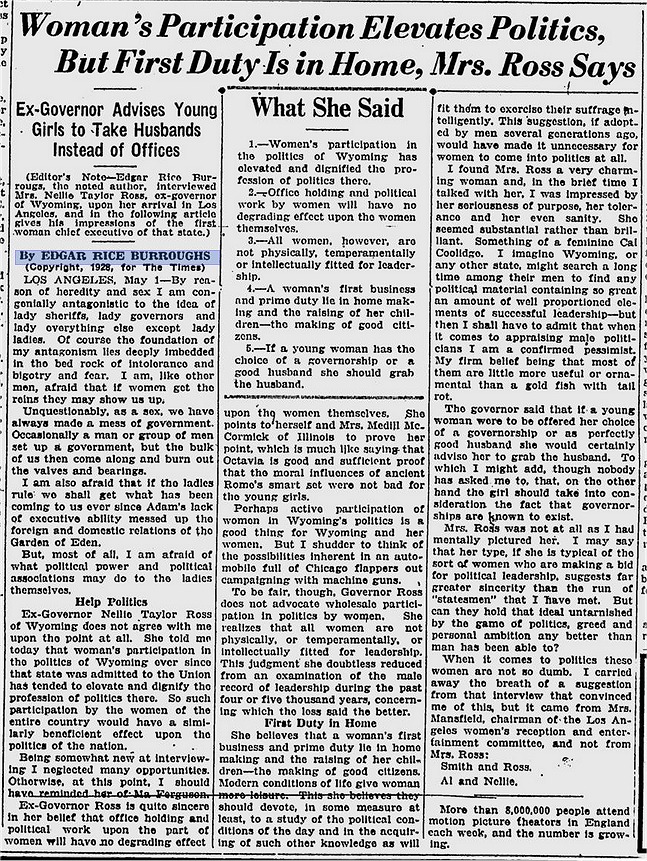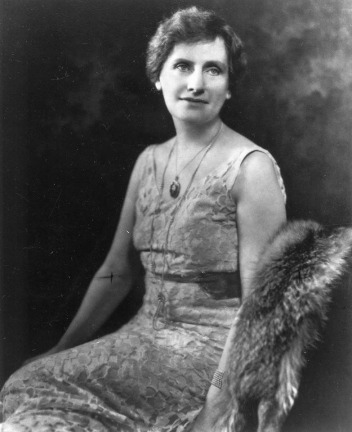What Makes Tarzan Act That Way?
By Edgar Rice Burroughs
Boston Sunday Post ~ June 19, 1938
(A revised version of the June 1932 article
from Writer's Digest: The
Tarzan Theme)

Some one is always taking the joy out of life. For twenty
years I proceed blissfully writing stories to keep the wolf from my door,
and to cause other people to forget for an hour or two the wolves at their
doors, and then up pops the editor of Writer's Digest and asks me for an
article on the Tarzan theme.
Frankly, there ain't no such animal; or if there is I
didn't know it.
Breathlessly, I flew to Mr. Webster, determined to create
a Tarzan theme with his assistance; but I was disappointed in somehow not
finding Tarzan in the dictionary. But I did find "theme". Webster calls
it: "A subject or topic on which a person writes or speaks; a proposition
for discussion or argument; a text."
That definition simplified my task, for under this definition
the Tarzan theme consists of one word - Tarzan.
"A proposition for discussion or argument," says Mr. Webster.
The Tarzan stories are a means for avoiding discussion or argument, so
that definition is out, and there only remains the last, "a text". As this
connotes sermonizing we shall have to hit it on the head, which leaves
me nothing at all to write about on the Tarzan theme.
Tarzan does not preach; he has no lesson to impart, no
propaganda to disseminate. Yet, perhaps unconsciously, while seeking merely
to entertain I have injected something of my own admiration for certain
fine human qualities into these stories of the ape-man.
It is difficult and even impossible for me to take these
Tarzan stories seriously, and I hope that no one else will ever take them
seriously. If they serve any important purpose, it is to take their readers
out of the realm of serious things and give them that mental relaxation
which I believe to be as necessary as the physical relaxation of sleep
-- which makes a swell opening for some dyspeptic critic.
I recall that when I wrote the first
Tarzan story I was mainly interested in playing with the idea of a contest
between heredity and environment. For this purpose I selected an infant
child of a race strongly marked by hereditary characteristics of the finer
and nobler sort; and at an age at which he could not have been influenced
by association with creatures of his own kind. I threw him into an environment
as diametrically opposite that to which he had been born as I might well
conceive.
As I got into the story I realized
that the logical result of this experiment must have been a creature that
would have failed to inspire the sympathy of the ordinary reader, and that
for fictional purposes I must give heredity some breaks that my judgment
assured me the facts would not have warranted. And so Tarzan grew into
a creature endowed only with the best characteristics of the human family
from which he was descended, and the best of those which mark the wild
beasts that were his only associates from infancy until he had reached
man's estate.
It has pleased me throughout the long series of Tarzanian
exploits to draw comparisons between the manners of men and the manner
so beasts, and seldom to the advantage of men. Perhaps I hoped to shame
men into being more like the beasts in those respects in which the beasts
excel men, and these are not few.
I wanted my readers to realize that, of all the creatures
that inhabit the earth or the waters below or the air above, man alone
takes life wantonly; he is the only creature that derives pleasure from
inflicting pain on other creatures, even his own kind. Jealously, greed,
hate, spitefulness are more fully developed in man than in the lower orders.
These are axiomatic truths that require no demonstration.
Even the lion is merciful when he makes his kill, thought
doubtless not intentionally so; and the psychology of terror aids the swift
mercy of his destruction. Men who have been charged and mauled by lions,
and lived to tell of the experience, felt neither fear nor pain during
the experience.
In the quite reasonable event that this statement may
arouse some skepticism, permit me to quote from that very splendid work
on animals, Mother Nature, by William J. Long, a book that should
be read by every adult and be required reading in every high school course
in the land:
"There are other and more definite experiences
from which to form a judgment, and of these the adventure of Livingstone
is the first to be considered, since he was probably the firs to record
the stupefying effect of a charging animal. The great missionary and explorer
was once severely mauled by a lion, his flesh being torn in eleven places
by the brute's claws, and his shoulder crushed by the more terrible fangs.
Here is a condensation of the story, as recorded in Missionary Travels
and Research in South Africa:
"'Growling horribly close to my ear, the lion shook me
as a terrier does a rat. The shock produced a stupor similar to that which
seems to be felt by a mouse after the first shake of the cat. It caused
a sort of dreaminess, in which there was no sense of pain nor feeling of
terror.'"
Compare this, then, with the methods of the present day gangster
who cruelly tortures his victims before he kills him. The lion sought only
to kill, not to inflict pain. Recall the methods of the Inquisition, and
then search the records of man's experiences with lions, tigers, or any
of the more formidable creatures of the wild for a parallel in studied
cruelty.
Let me quote one more interesting instance given in Mr.
Long's book:
"We open at random to the experience of an English officer
who, in 1895, was fearfully clawed and bitten by a lion, and who writes
of the experience:
"'Regarding my sensations during the time the
attack upon me by the lion was in progress, I had no feeling of pain whatever,
although there was a distinct feeling of being bitten; that is, I was perfectly
conscious independently of seeing the performance, that the lion was gnawing
at me, but there was no pain. To show that the feeling, or rather want
of it, was in no wise due to excessive terror I may mention that, whilst
my thighs were being gnawed, I took two cartridges out of the breast pocket
of my shirt and threw them to the Kaffir, who was hovering a few yards
away, telling him to load my rifle.'"
Perhaps I am not wise in giving further publicity to these
statements, since they must definitely take much of the thrill out of Tarzan
stories by placing lion mauling in a category with interesting and pleasurable
experiences.
Having demonstrated that the most savage animals in their
most terrifying moods reveal qualities far less terrible than those possessed
by man, let us see how association with these beasts combined with the
hereditary instincts of a noble bloodline to produce in Tarzan a character
finer than either of the sources from which it derived.
Necessity required him to kill for food and in defense
of his life, but the example of his savage associates never suggested that
pleasure might be found in killing, and the chivalry that was in his blood
stream prevented him imagining such pleasure in youth without such example.
His viewpoint toward death was seemingly callous, but it was without cruelty.
His attitude toward women and other creatures weaker than
he, was partially the result of innate chivalry; partially the natural
outcome of a feeling of superiority engendered both by knowledge of his
mental or physical superiority to every creature that had had come within
his ken, and by heredity; and partially by an indifference born of absolute
clean-mindedness and perfection of health.
His appeal to an audience is so tremendous that it never
ceases to be a source of astonishment to me. This appeal, I believe, is
based upon an almost universal admiration of these two qualities, and the
natural inclination of every normal person to enjoy picturing himself as
either heroic or beautiful or both. Linked to these is the constant urge
to escape that is becoming stronger in all of us prisoners of civilization
as civilization becomes more complex.
We wish to escape not alone the narrow confines of city
streets for the freedom of the wilderness, but the restrictions of man-made
laws, and the inhibitions that society has placed upon us. We like to picture
ourselves as roaming free, the lords of ourselves and of our world; in
other words, we would each like to be Tarzan. At least I would; I admit
it.
Unconsciously or consciously, we seek to emulate the creatures
we admire. Doubtless there are many people trying to be like the late Theodore
Roosevelt, or like Robert Millikan, or Jack Dempsey, or Doug Fairbanks,
because they greatly admire one of these characters. Fiction characters
are just as real to most of us as are these celebrities of today or the
past; d'Artagnan is as much flesh and blood as Napoleon. Perhaps the influence
of d'Artagnan has had a finer influence upon the forming of character than
has that of the great Corsican.
To indicate the force for good which a fiction character
may exercise, I can do no better than cite the testimony of Eddie Eagan,
Amateur Heavyweight Champion of the World, whose very interesting series
of articles appeared in the Saturday Evening Post. As a boy Eagan read
the Frank Merriwell books, and his admiration for this fiction character
shaped his future life. Among other achievements Merriwell became an athlete
and a Yale man, and these became two of Eagan's ambitions. Although a poor
boy, Eagan worked his way through an education, first in college in Denver,
then through Yale, and finally Oxford; and he became one of the greatest
athletes of our times.
Years ago, when I came to a realization of the hold that
Tarzan had taken upon the imaginations of many people, I was glad that
I had made of him the sort of character that I had; and since then I have
been careful not to permit him to let his foot slip, no matter what the
temptation. I must admit that at times this has been difficult when I have
placed him in situations where I would not have been quite sure of my own
footing, and it has also not been easy to keep him from being a Prude.
On the whole, however, I must have been more or less successful,
for all ages and both sexes continue to admire him; and he goes his bloody
way scattering virtue and sudden death indiscriminately and in all directions.
He may not be a force for good; and if he entertains,
that is all I care about; but I am sure that he is not a force for evil,
which is something these days.




















